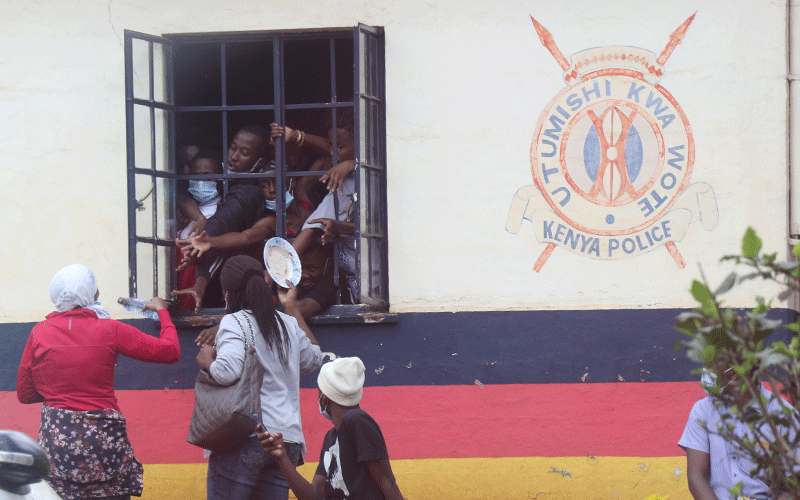Why teenagers today opt for house parties

Milliam Murigi @millymur1
Biological pressures, technology, easy access to money, hustling parents and socialites for role models, are some of the ingredients that make or break a teenager.
These added to societal norms such as peer pressure, if not handled well, are the perfect mix of a powder keg.
As Kenyans come to terms with the reality of a teenage population gone rogue and engaging in binge-drinking, drugs and sex, most youngsters feel it is society that does not understand them.
Jean Were, 17, says social pressure is one of the main reasons teenagers adore house parties, among other things.
In many cases, she says, trying to be and look “cool” makes it difficult for them to decline an invite to visit a “trap house”, a place where chidlren go to drink, socialise and spend the night.
“You will definitely think of the consequences, but ignore them since your main goal is to have more friends and be accepted by your peers.
In most cases, teens are unable to see anything wrong with this because they get asked whether they drink or smoke before they are invited for such an event,” Jean says.
Unbothered parents
Usually, she adds, once someone has been invited to such a party, they tag along a few friends willing to join them, and thus the cycle goes.
Often, the invites are through word of mouth, but technology has made it much easier.
Unlike days of yore when arranging meetings depended on mail with a snail’s pace or a call on a landline, today the mobile phone has made it easy to organise such gatherings with instant response from groups of more than 250 members.
WhatsApp groups and other social media platforms such as Instagram, Telegram, Facebook, Snapchat, and the latest Tiktok, have added spice to being a teenager.
Once the meeting is set, spending the night away from home is the next hurdle.
“You will then lie to your parents that you are going for a sleep-over or a study session at a friend’s place, preferably a close one that they are familiar with.
Since most parents don’t bother following up provided they know the friend, you would have managed to swiftly attend the party.
Most of the time, at a stranger’s house,” she adds, admitting that although she has never been invited her knowledge about alcohol and drug abuse cannot allow her to attend.
Bill Orina says it is “quite difficult” to ignore the invites at his age because it is something most teenagers do anyway.
“As a 19-year-old boy, your friends expect you to be able to handle any form of party because of the younger girls that are invited and alcohol we manage to buy.
At this stage drinking is what determines how bold you are or how cool people view you as.”
Popular clique
Jane Wambui, a Form Two student from Kerugoya town in Kirinyaga county, is no stranger to peer pressure.
She claims it is one of those societal forces that manifest early in the estate, until one is older and singing in the local church’s Women’s Guild.
“When you put children from different backgrounds in one place, they will automatically try and form cliques depending on where they come from or how much money their parents have.
Having come from a boarding school, I already knew this and understood that not belonging to the popular clique would not kill me.
I have always used my good grades in school to define myself,” the16-year-old student says.
Jane says she would understand if someone was truly desperate and the only way to raise money for food or school fees was to go out for sex parties.What she does not understand is how teenager are doing it for pleasure.
“I understand we are all bored, but I do not completely understand why someone would go to these parties.
But I have done a few bad things at my friends’ insistence, so I cannot completely judge my peers.
But I thank God my mum is very strict. She cannot let me visit any of my friends unless she is coming with me.
I think I could probably lie to her and say I’m going to visit my brother in Nairobi then maybe make my way to one of the parties.
But she would find out the same day, probably on calling my brother, and probably pay good money to get me arrested to teach me a lesson.
But I do not even think it would be worth the trouble,” she narrates.
Inadequate punishment
According to Kabii Thuo, a sociologist, for teens, spending a lot of time alone with the Internet and social media has become fodder for peer influencers and rogue elements in society.
Apart from peer pressure, the majority of parents are overwhelmed and honestly don’t know what to do, and where they know, they have no means of mitigation.
“We are dealing with a multifaceted threat of illicit sex, drugs, alcohol, and adult influencers using technology and teens’ social group dynamics.
A bit too much and too complex for parents struggling to meet the normative needs,” he says.
The social, political, and economic events of today expose teenagers to an unenviable challenge of threats as compared to the teens of, say, a decade ago, he adds.
The social environment and economic realities of the day have rendered societal models unable to cope with arising issues.
And since today’s teenagers are the first generation whose lives are saturated by mobile technology and social media, most of them are more open to adult issues.
“Today’s generation has their minds so wrapped up in social media and in themselves to see the real world around them.
The fear of not having enough followers and likes has consumed them. New media is making teens lonelier, anxious, and depressed, and is undermining their social skills and even their sleep,” says Thuo.
Dr Gladys Nyachieo says besides the social media influence, most teens today feel entitled. They want to experience and experiment with everything, she notes.
“They lack respect for parents or elders,” she says, adding that parents have a hand in this behaviour.
“Parents have contributed to these changes by not being available to deal with the issues first-hand.
House helps have been a big part of bringing up these kids and influencing them differently.”
Studies have indicated that more than 24 per cent of Kenyan children aged 12-17 years access the internet several times a day, and 42 per cent two to three times a week.
Most of them prefer the smartphone to access the internet because of their portability and privacy.
As such they are exposed to cyber predators who use these platforms to lure them then rape them for both pleasure and profit.
This has turned to be a new culture where the teen is not just a victim, but also a key accomplice.
The threat here can be summed up as life and death consequences of adult activities done by children, according to experts.
With all these happening, Thuo says that today’s teenagers simply cannot handle the consequences and the psychosocial impact.
Because of this, the result is teenagers will start skipping a socialisation phase traditionally designed to prepare them for adulthood.
According to him, the solution lies in engaging teens meaningfully and crafting a motivational mechanism for them as they stay engaged.
Society must rise and proactively prepare for the challenges and threats facing today’s teenagers.
“Punishment of whatever kind or method will not suffice since we are seeing the fruits of many seeds sown and natured by the very society. It is not just a teens issue,” he explains. Additional reporting by Sandra Wekesa and Njeri Maina









